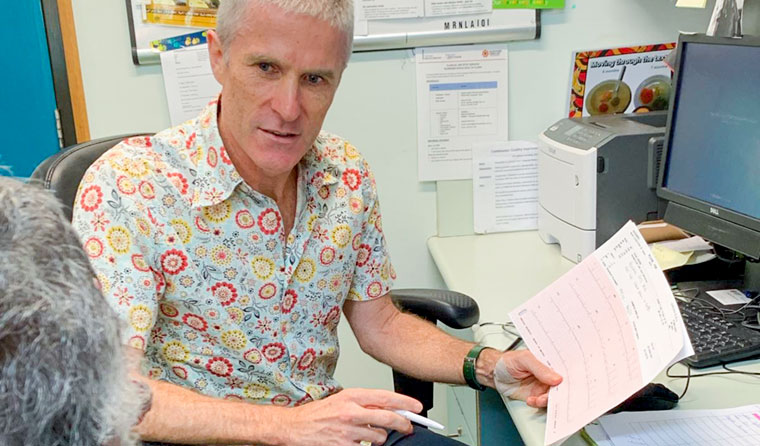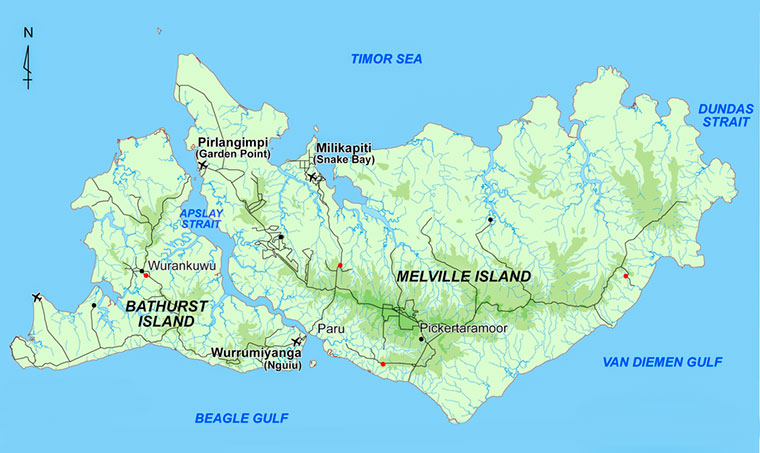Profile
Sea change: Life as a GP in the Tiwi Islands
Dr Justin Coleman recently made a major life change, uprooting from 12 years of city living to move to the remote Tiwi Islands.
 The township of Wurrumiyanga, on Bathhust Island, where Dr Coleman now lives and practises. (Image: Ash Webb)
The township of Wurrumiyanga, on Bathhust Island, where Dr Coleman now lives and practises. (Image: Ash Webb)
After nine months in their new home in Wurrumiyanga township on Bathhurst Island, Dr Justin Coleman and his wife have no regrets on their move – even though their new situation has presented some significant challenges.
‘Everything about our day, and our week and our month is all different. There are very few threads we’ve managed to maintain from our life in the city,’ Dr Coleman told newsGP.
‘You really, to some extent, cut yourself off from some of the supports you used to have, and then you have to find new ones.’
Certainly, the Tiwi Islands, which sit 80 km to the north of Darwin adjoining the Timor Sea, are about as far away as you can get from city life.
The remote islands have an 89% majority Aboriginal population and a unique climate supporting large numbers of animal and bird life, much of it not seen outside of the Tiwis.
The islands’ remoteness comes with challenges that would come as a shock to many city-dwellers.
‘It’s a lovely community, but it’s akin to the sort of changes you might see if you decided to go to East Timor for a year, or another country, – it’s so different from the mainstream Australian life,’ Dr Coleman said.
‘It is a town with no library, no cafe, the shop is a windowless large container, rather than what we would consider a normal shop. You sometimes get your rubbish collected and sometimes you don’t. And sometimes the food comes in on the barge and sometimes it doesn’t.
‘So there’s just a lot more uncertainty.’

‘I’ve treated myself to a steep learning curve again, professionally. I have certainly had to re-learn a lot of things I hadn’t dealt with much over the last decade or so,’ Dr Coleman said of being a GP in the Tiwi Islands.
The relocation was actually initiated by Dr Coleman’s wife, a secondary school deputy principal, after the last of their three children completed year 12.
‘She saw a job going at a local [Tiwi Islands] secondary school, and took a couple of weeks to talk me into the concept,’ he said. ‘Then she went for the job and got it, and I had to make a decision as to whether my part of it would be sustainable.
‘So it was a joint decision, really, based on the freedom we had without the children.’
While the relocation from Brisbane to the Tiwi Islands seems a radical change, it was actually the third time the couple had made such a move.
‘The first was when we just had a little baby, a one-year-old, and I did all my registrar training in the remote Northern Territory,’ Dr Coleman explained. ‘And that was doable because my wife was happy to look after the baby at home, and she got a bit of teaching work there, part-time.
‘The second stint was about eight or nine years later, when we had all three of our children and they were in primary school. We went to Jabiru, Kakadu National Park, for two years and that was brilliant timing, for the kids to experience life in an Aboriginal community in primary school.’
But while the couple has gone through the process of moving and resettlement before, Dr Coleman found this experience did not insulate them from the strangeness of change.
‘There’s always a little bit of culture shock, which is a natural process; I don’t think it’s unhealthy, you have to realise that you’re going through it,’ he said.
‘And that certainly did occur when we first arrived.’
Dr Coleman has had to adjust to a different pace of life, due to the fact the islands’ isolation means many items or processes are not available as quickly they may be in the city. For example, internet access, essential to his work as a medical writer and educator, took a few months and many, many phone-calls to achieve.
‘It’s good to sort of have a fairly laconic attitude to it, in the sense that if something doesn’t work you just have to wait, and eventually it might work fairly well,’ Dr Coleman said. ‘So there’s a lot of that that does tend to pervade your professional and your personal life.’
But he also feels he has plenty to gain from the move, especially as a GP.
‘I’ve treated myself to a steep learning curve again, professionally,’ Dr Coleman said.
‘I have certainly had to re-learn a lot of things I hadn’t dealt with much over the last decade or so. There’s some very sick people, and there’s that whole aspect of being the emergency medicine, so we are the ambulance, we are the emergency service.
‘The buck stops here on the island, unless you get evacuated by plane to Darwin.
‘So all those sorts of things which I’ve been a bit shielded from, working in a big city, right near a hospital and ambulance service, all of a sudden I have to learn again. And I humbly find I’m not as good at those things as I probably was 15 years ago, when I did them more often.
‘I really feel I’m broadening my scope, markedly, which is fantastic.’

The Tiwi Islands sit 80 km to the north of Darwin, adjoining the Timor Sea. (Image: Wikimedia Commons)
Dr Coleman also credits the nature of general practice itself as helping to make such a decision possible.
‘The beauty of general practice is that it’s general, and even though every community will have its own particular high prevalence of certain things, I think it’s actually much easier as GP to move into a completely different working environment than it would be if you had specialised in one area,’ he said.
‘Even the things that are rare in urban populations and common [in the Tiwi Islands], GPs in the city do still see them, occasionally. For example, we have 24 patients on dialysis, which is remarkable for a very small community, but it’s not as if dialysis is something that a GP is not used to dealing with.’
While Dr Coleman and his wife do miss many things about their former lives, from friends and family to ready access to smashed avo and cappuccino, the Tiwi Islands also offer plenty of personal satisfactions, as well as close-knit community life.
‘Rather than what you think might happen, which is that people would take a long time to trust you, I find the opposite, possibly because of the legacy of people who’ve been here before and have done a good job. We walk into that legacy and are continuing it,’ Dr Coleman said.
‘The Tiwis have been extraordinarily welcoming, which has been fantastic.’
When discussing what it takes to make such a major lifestyle change, Dr Coleman reflects on the intersection of the personal and the professional, and the way these are affected by relocating to a remote location.
‘When you do something like this, the job is very different and your entire living situation is very different. I find both of them fascinating and worthwhile,’ he said.
‘But I think if either one of the two didn’t suit you, you wouldn’t last in the in the job because it’s not only a career decision, but also a lifestyle decision.
‘When you choose a job in the city, the job can be compartmentalised to one part of your life. And people put up with jobs they don’t really like or that aren’t going well because it’s convenient, and they have the rest of their life, their hobbies and friends and family to support them through that.
‘Whereas if you do go remotely, you need both halves ticking along nicely because there’s not enough else to sustain it.
‘So you really have to make sure that both are working for you.’
general practice remote medicine Tiwi Islands
newsGP weekly poll
Health practitioners found guilty of sexual misconduct will soon have the finding permanently recorded on their public register record. Do you support this change?